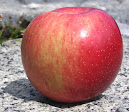 |
| public-domain image |
Eccentric and saintly, Johnny Appleseed is an unlikely member of the pantheon of American folk superheros that includes such he-men as Davey Crockett, Paul Bunyan, and John Henry.
Like Crockett, Johnny Appleseed was a real person, though his name was John Chapman.
Born in Fitchburg, Massachusetts, in the early days of the American Revolution, Chapman grew up in Westfield and headed west to become a frontier nurseryman, bachelor, and sometime Swedenborgian evangelist.
He gleaned apple seeds from cider mills and eked out a living planting them and selling saplings to settlers.
Historian William Kerrigan has given us a view of Chapman's life, but also of ourselves, in his book Johnny Appleseed and the American Orchard: A Cultural History (Johns Hopkins University Press 2012).Kerrigan traces Chapman's story from his family's beginnings in colonial Massachusetts to his apotheosis into folk legend and Disney character, a process mediated by American culture.
Along the way Kerrigan, a history professor at Muskingum University in Ohio, paints a vivid portrait of the American frontier in the time between the Revolution and Chapman's death in 1845.
His account of Chapman's life veers fruitfully into stories about apples and cider and their social and economic significance in American life. These detours include some of my favorite stories of his book, chronicling the social and political divide between lowly sapling pippins and high-born grafted cultivars.
Cider figured in the presidential election of 1840 and was later a target of the temperance movement.
Kerrigan brings us up to date with accounts of the Red Delicious bubble of the 1980s, recent Johnny Appleseed scholarship, and modern business models for breeding and marketing new apple varieties.
It's not surprising that what really sets this book apart is its scholarship. Kerrigan tells this story with many primary sources and concludes with a short essay on all his sources.
The author continues to explore this territory on his blog, American Orchard (review), where he both excerpts and augments his book.
Kerrigan also uses his blog to tell us where we can buy Johnny Appleseed and the American Orchard.

Comments
Post a Comment
Join the conversation! We'd love to know what you think.